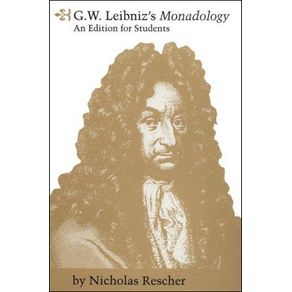G.W. Leibniz’s Monadology, one of the most important pieces of the Leibniz corpus, is at once one of the great classics of modern philosophy and one of its most puzzling productions. Because the essay is written in so condensed and compact a fashion, for almost three centuries it has baffled and beguiled those who read it for the first time. Nicholas Rescher accompanies the text of the Monadology section-by-section with relevant excerpts from some of Leibniz’s widely scattered discussions of the matters at issue. The result serves a dual purpose of providing a commentary of the Monadology by Leibniz himself, while at the same time supplying an exposition of his philosophy using the Monadology as an outline. The book contains all of the materials that even the most careful study of this could text could require: a detailed overview of the philosophical background of the work and of its bibliographic ramifications; a presentation of the original French text together with a new, closely faithful English translation; a selection of other relevant Leibniz texts; and a detailed commentary. Rescher also provides a survey of Leibniz’s use of analogies and three separate indices of key terms and expressions, Leibniz’s French terminology, and citations.



